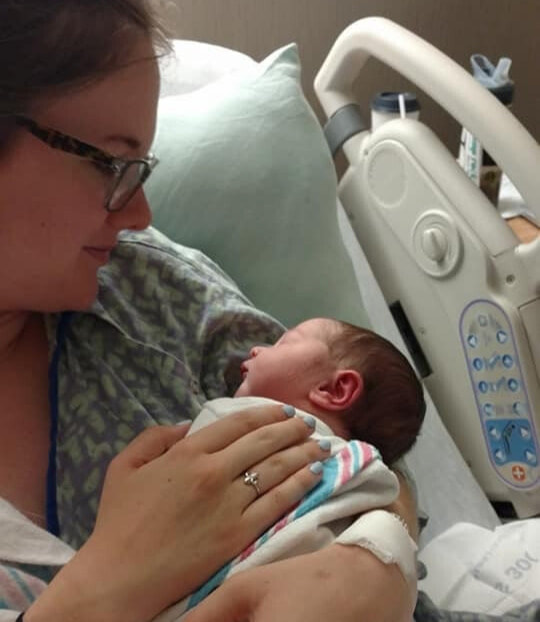|
Whether or not you tell your college professor about your pregnancy is a personal decision that depends on various factors. There are many reasons you might tell your professor, especially if you expect your pregnancy to impact your attendance, participation, or ability to complete your assignments. Having a quick conversation with your professor could also help you worry less about your class during an already stressful time. If you decide to tell your college professor that you’re pregnant, factor in your due date, the specific course requirements, and your overall health when planning what you want to say. Consider these pros and cons when deciding whether to tell your professor you’re pregnant.
Pros of telling your college professor you’re pregnant:
Cons of telling your college professor you’re pregnant:
How should I tell my professor I’m pregnant? Here are some tips for talking to your professor and planning a successful semester. Consider talking to your college advisor, a disability coordinator, or a guidance counselor before talking to your professor. They will be familiar with your institution’s maternity leave policies as well as Title IX law, which protects people from discrimination in educational programs. Your college may also have support services, such as counseling, academic advisors, or a student affairs office. Consider reaching out to these, and other resources for additional guidance and support (our team at The Avi Project is available 24/7 at 720-386-6009!) If you’re in the early stages of pregnancy and don’t anticipate immediate academic challenges, you might choose to wait to speak to your professor. If you’re concerned about privacy, ask your professor about how they handle sensitive information and whether they can keep this matter confidential. When you do talk to your professor, plan ahead and prepare what you want to say and any questions you may have. Think about your academic needs, potential adjustments, and any concerns you want to address. Choose the right time and place, like during the professor’s office hours or after class, to ensure you have enough time for a private conversation without interruptions. Discuss potential adjustments or accommodations you might need, ask for flexibility, and also ask for your professor’s guidance on how to manage your academic responsibilities during this time. Inquire about any options for extensions, makeup work, or alternative arrangements. Approach the conversation with respect and professionalism. Remember that your professor is there to help you succeed academically! During the conversation, take notes on any agreements or arrangements you both discussed, to help ensure you both have a clear understanding. Keep documentation of any arrangements you made verbally with your professor as well, and consider sending them a quick email confirming those arrangements. If any action items arise from the conversation, make sure to follow up with your professor in a timely manner. This demonstrates your commitment to managing your responsibilities. Touch base again closer to your due date to put your mind at ease. Email Template If you’re thinking about emailing your professor, we’ve provided a template you might use as a guideline to get you started. Be sure to tweak it depending on your circumstances. Hello Professor [Last Name], I’m [Name], a student in your [Course Name] class. I wanted to let you know that I am currently pregnant and am expecting to deliver in [Month/Year]. I’m excited for your class, and wanted to work with you to find the best way to manage my assignments and coursework while maintaining flexibility to make my prenatal appointments. What is the best way to get in touch with you if I expect to miss a class due to a doctor appointment? There are also certain coursework details I would like to receive early, if possible, so I can work ahead and make sure I meet all of the due dates. If it’s possible, I would appreciate the opportunity to meet with you to further discuss any potential modifications, as well as how I might make up course work if I have to miss a class. Thank you for your understanding and guidance, I appreciate it! Please let me know a convenient time for you to meet, or if you prefer, we can communicate via email. Sincerely, [Your Name] You’ve got this. You might feel anxious about telling your professor you’re pregnant, but it’s important to give yourself the tools you need to achieve success, and to give your professor the chance to help you be the best student you can be! If you’re nervous about talking to your advisor or professor about your pregnancy, call or text our compassionate and understanding team any time of night or day (we’re available 24/7!) at 720-386-6009. The Avi Project is dedicated to helping expectant students, so you can get the support and encouragement you need for academic success.
0 Comments
Being pregnant in college can be a daunting experience, filled with uncertainty and overwhelming emotions. However, it's essential to remember that you are not alone in this journey. If you’re unexpectedly pregnant in college and wondering what to do, this step-by-step guide can help you make informed decisions and access support.
First, know that being pregnant doesn’t mean you have to quit college. Yes, you can be pregnant in college, and pregnancy doesn't have to be a barrier to completing your college education. Talking to academic advisors about adjusting your class schedule can help you find a manageable balance between your studies and pregnancy. Discussing flexible study arrangements with professors and exploring online or remote learning options can help faculty and staff accommodate your needs. Understanding your college's policies on pregnancy and maternity leave will enable you to plan ahead and utilize available resources. Researching your rights as a pregnant college student, and familiarizing yourself with Title IX, a federal law that protects against pregnancy-related discrimination, can help ensure fair treatment and access to necessary accommodations. Looking into scholarships tailored for pregnant and parenting students can ease financial burdens and help you focus on your education. Knowing about potential workplace accommodations for pregnant or parenting students can also help you manage your responsibilities effectively. You have options! With the right approach and support, you can embrace motherhood and continue your educational journey with confidence. Next, confirm that you truly are pregnant. Many home pregnancy tests claim to be 99% accurate when used properly. You may choose to confirm the pregnancy with a free medical pregnancy test, to gain peace of mind while considering next steps to take. The Avi Project can refer you to one of the many places that offer these tests at no cost, including health clinics, community centers, and women’s health organizations - just call or text 720-386-6009. If you’re more comfortable with your gynecologist or family doctor, they can conduct a thorough examination to confirm the pregnancy. Confirming the pregnancy is the foundation for making decisions about your future and your medical care. Whether you visit a healthcare provider or opt for a free medical pregnancy test, taking this step empowers you to make informed choices and receive the support and care you need. Lean on a support system. Don't underestimate the power of emotional support. Confide in the people closest to you about your feelings and concerns about your pregnancy:
Open communication with your partner is also crucial; they should be involved in the decision-making process and provide support as well. If you don’t feel comfortable reaching out to your partner about your pregnancy, it’s important to seek guidance from a licensed counselor or even a legal professional. Your safety is important! Take the time to work through your emotions and thoughts about the situation, as this is an important aspect of processing and decision-making. If you’re unsure of what to do next, don't hesitate to reach out to professional resources that specialize in helping pregnant college students, such as The Avi Project. We are available 24/7 by call or text at 720-386-6009. Building a support network of understanding friends, family, and fellow students will provide a safety net throughout your pregnancy and beyond. Remember, you have the strength and resilience to navigate this journey successfully, and with the right support, you can still achieve your goals and dreams. Figure out what your options are. Take the time to reflect on your unique situation and determine what your options are. Unexpected pregnancy can present many challenges, and it's crucial to research the options available to you and make an informed decision. Each option carries its own set of considerations, so take the time to weigh the pros and cons of each choice. Reach out to trusted friends, family members, or counseling services to discuss your feelings and thoughts, as their support can be instrumental in helping you navigate this pivotal moment in your life. The Avi Project partners with licensed counselors and compassionate advisors to bring these services to pregnant students cost-free. Seeking guidance and support can empower you during this time of uncertainty. Make a plan for your future. When you’ve considered all of your options and worked through your emotions with the support of trusted individuals, make a plan for continuing to attend your classes and finishing your degree:
Remember, while unexpected, this situation does not have to derail your dreams. With a well-thought-out plan and a strong support system, you can still achieve your educational and career goals. Take it one step at a time, seek help when needed, and believe in your ability to thrive. Continue taking care of your health. Your health and well-being, as well as that of your baby, are of utmost importance. Make sure to attend regular prenatal check-ups, follow your healthcare provider's advice, and maintain a healthy lifestyle with a balanced diet and regular exercise. Taking prenatal classes can help you prepare for childbirth and parenthood. These classes often cover topics such as labor and delivery, newborn care, breastfeeding, and postpartum support. The knowledge and skills gained from these classes will boost your confidence as you approach motherhood. Familiarize yourself with local parenting resources, such as pediatricians, family support centers, and childbirth education programs. Having this information at hand will ensure you have a network of support and assistance once the baby arrives. College life and pregnancy can both be demanding, so it's vital to prioritize self-care and manage stress throughout your pregnancy. If you feel overwhelmed, our team at The Avi Project can help you find medical care and financial assistance (720-386-6009), and take one more thing off your to-do list. Don’t forget to find joy in the present moment, as much as possible. Remember to frequently reconnect with the present moment, and take time for activities that bring you relaxation such as reading, walking, or journaling. As difficult as this journey is, finding small joys throughout your day and taking each day one at a time can help you get through it. Stories From A Doula
When I was twelve years old, I witnessed my mom give birth to my youngest brother, James. I wasn’t afraid or scared of what I saw, rather I was amazed at my mom’s strength, determination, self-gift, and the physical sacrifice she endured to bring me and my siblings into the world. That was my first exposure to birth, and it was a beautiful experience I’ve carried with me through adolescence and into adulthood. Throughout college, my love for women, babies, and pregnancy grew, as did my interest in labor and delivery. Fast forward a handful of years, pregnant with my first child, I attended my first doula training weekend in Minnesota. I had a vague idea what a doula was but wanted to learn more. What is a doula? The Greek word doula means woman caregiver or servant. Doulas are more common in countries outside of the United States but are slowly becoming more popular as research is proving how much doulas help with the labor and delivery process. When people ask me what exactly a doula is, I like to say, “A doula is someone who simply accompanies a pregnant mama.” Doulas walk with women during their pregnancies, meet before the birth to talk through labor and delivery, and make sure we understand what the mother desires for her birth and how we can best support her. When labor does begin, the doula’s role is to remain by the side of the mother and attend to her emotional and physical needs throughout the birthing process. Do I need a doula? This depends entirely on whether you want a doula! I have been a doula now for 7 years, and after experiencing my own four pregnancies and births, I feel I can share what I have seen and learned along the way. I, along with every woman and mother I have met and worked with, have exhibited a deep need for companionship during pregnancy. Mothers want to feel seen and heard. A mother wants to know that someone genuinely cares about her experience of pregnancy and childbirth- the joys, hardships, sacrifices, and the mental and emotional weight that it entails. All women, at some point, need validation that what they are experiencing during pregnancy and childbirth matters. Humans need affirming and uplifting companionship in life, and mothers feel this in a particularly deep way as pregnancy and childbirth are the most intense biological process humans experience. To the women who hope to get pregnant- you are seen. To the women who never wanted to get pregnant and are - you are seen. The weight of what you are experiencing at this moment is real. Women often find peace when they know they have a friend to walk with in pregnancy and labor. Some of my favorite parts of working with clients are during the prenatal meetings I have with them in the weeks leading up to their due date. We talk about their feelings about birth, their fears, anxieties, and what brings them excitement and peace. It’s a time to name specific worries before the baby is born, and conversely, share things that excite them or bring them joy. The act of voicing these feelings aloud often brings comfort, and a doula is trained to walk with mothers in this way specifically. When the day arrives and the mama is in labor, my goal as a doula is to make labor and delivery a positive and affirming experience so that the mother can look back and say, “That was really hard and I did it!” Doulas stay by the laboring woman’s side throughout her labor, providing her with comfort measures to help with pain and discomfort, techniques to help provide a smoother delivery, and offer emotional support. We try to keep the environment positive and peaceful and work to nurture and protect the woman’s memory of her birth experience. Nurses and OBGYNs are remarkable healthcare providers, and often times birthing mothers find distinct comfort and consolation in the companionship and support of a partner trained and focused exclusively on their birthing experience, and doulas supplement healthcare providers beautifully in this way. How much does a doula cost? The Avi Project partners with many generous people who work to provide cost-free pregnancy care to students. If you are reading this blog and are pregnant, I encourage you to reach out to The Avi Project to seek loving companionship during your pregnancy journey. If you know someone who is pregnant, I encourage you to reach out to them to listen, support, and affirm their experience. There’s nothing in life quite like carrying and delivering a child, and there are people who want to walk with you as you navigate the journey. Text at any time of day or night at 720-386-6009 or email us to learn more about working with a doula through The Avi Project. When I started college, I had my life completely planned out. I was going to finish my
degrees, find a great job, get married, and have a family- simple! I had always heard stories of women who found themselves unexpectedly pregnant, confused, and scared, and thought quite confidently that that could never be me-- until it was. I was 21 years old, starting my senior year at The University of Alabama. I had been dating my boyfriend for about 2 years at the time, and we found out we were pregnant in October of our senior year. I honestly felt like my life was shattered. I became numb. I felt like I was wearing a scarlet letter. The shame that I experienced being pregnant out of wedlock was so heavy. I truly didn’t know what to do. In those early months of being pregnant and being on campus, I thought about abortion a lot. I thought “All of this could just go away. Abortion could fix this. It could fix my life. My life could go back to normal, and I could do all of the things that I had planned in my life. I could avoid all of this embarrassment and shame.” These thoughts ran through my mind constantly. I felt so alone. Thankfully, I was raised in a very pro-life environment, so I was able to remind myself the truth about human life, the reality of abortion, and remain grounded in the fact that abortion would not “solve” anything. There was still so much shame and pain in my heart that I wanted to go away, and abortion tells women “It’ll all go away.” That is a lie. Taking a life can never heal your pain. And I think one of the biggest lies of our society is that suffering is bad. If something is hard, avoid it at all costs. But things that are hard are the things that form us into who we are meant to be. Suffering and hardship make us stronger, more resilient, more passionate, more understanding, and more empathetic to others. This is what our society has lost. The gift of a new life is an opportunity for growth- that doesn’t mean it is easy, but entering into hardship is what gives us the strength that we need to flourish and grow as women. That being said, it was still a very heavy time for me because many people did not know that I was pregnant, I wasn’t showing yet, and I had this constant thought that if anyone knew, they would judge me. I was angry. I felt like it wasn’t fair. My entire life was going to be changed forever, and I wasn’t prepared. I wasn’t connecting to the baby inside of me. My body was physically changing and growing in ways that I wasn’t able to prepare for, it just happened. My mind was flooded with uncertainty and questions- How am I going to raise a child and be a mother when I’m not prepared for this? How am I going to provide for a child when I don’t have a job or a husband? Am I going to lose my relationships? What will people think of me being pregnant and unmarried, especially in the church? What about my dreams? It is terrifying to ask those questions. If you are asking those questions right now, let me be the first to tell you that you have options, it is possible, you are strong enough, and there is help for you. There is so much help and support out there for women like me in these situations. I went to a pregnancy resource center in my college town that offered me a free ultrasound and counseling. When I saw my son on the ultrasound for the first time, tears filled my eyes, and I saw a tiny little baby boy inside of me. I still didn’t know what I was going to do or how my boyfriend and I were going to figure it all out, but I knew that that tiny little person needed me. We decided to keep and parent our son, and I moved back in with my parents after I graduated in December 2019. I became connected with a similar pregnancy resource center in my hometown which offered us so much support and tangible aid. My boyfriend and I attended parenting classes there and connected with other men and women in similar situations. The resource center provided us with clothes, diapers, supplies, and even a crib for our son. I went on to finish my Master’s degree and my boyfriend finished his Bachelor’s degree while also working and being parents. My boyfriend and I got married in 2020, and we had a second child in 2021. Our son is now 4 years old, our daughter is almost 2, and we absolutely love this life that we didn’t plan. I want everyone who finds themselves in an unplanned pregnancy to experience the joy, beauty, and abundant life that I have experienced. Through all of the pain, hardship, unknown, and loneliness of going through that pregnancy, the gift that I was given was even more beautiful and outweighed all of it. I know this is cliche, but I truly would not be the woman I am today if it weren’t for my son. It was hard then, and it is still hard being a young mother, but I am so much more fulfilled and joyful. Being a mother has challenged me and motivated me and my husband in everything we do. I cannot express how thankful I am for that unplanned pregnancy. The thing that I thought was destroying my life actually saved me and healed me in ways I never could have imagined. If you are going through an unplanned pregnancy, you are stronger than you think you are. There is help for you. You are not alone. I may never meet you, but I see you. You can do this. Karen Plough |
Archives
May 2024
Categories |
|
The Avi Project is a 501(c)(3) charitable organization, and contributions are tax-deductible. Our EIN is 87-3676173.
Your donation will make a significant difference in the life of our client and her baby! |







 RSS Feed
RSS Feed